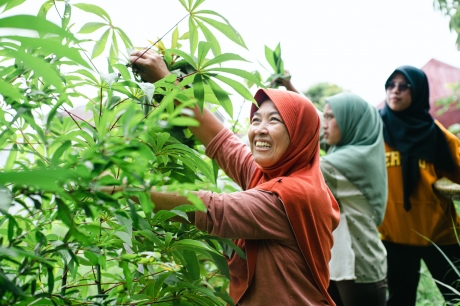Agricultural transformation starts in the backyard: Family farming offers self-sufficiency and a return to nature in Indonesia
Nissa Wargadipuras’s earliest memories involve learning how to live with nature. Her childhood home’s backyard in the hilly town of Garut, West Java was a little forest where her father planted vegetables, herbs and fruits. Her mother produced traditional medicine from the plants for their family and their neighbours.
Nissa’s idyllic memories of her Garut childhood speak to the deep roots of family farming in rural Indonesian life. But her struggles to maintain those traditions against political adversity and poverty are illustrative of the threats family farmers have faced across Indonesia.
Nissa decided to find a way to empower the farmers, decrease their dependency on intermediaries and rekindle the experience of living close to nature.
But the only way farmers and their children would regain confidence in their traditional wisdom, Nissa reasoned, was through education. In 2008, Nissa and her husband established a farmer field school called At-Thariq (meaning “the way” in Arabic) to teach agroecology, food security and religion to young people. Students also enrolled in traditional schools for formal education.
Students sleep and eat at the school. They also receive sustainable farming lessons, learning mainly by doing.
On only one hectare of land, Nissa designed a planting system based on intercropping, where various crops are cultivated simultaneously in the same field. The planting area is divided into several zones: a zone for tropical fruits, a fishpond in another zone and a staple food zone where they grow cassava and taro. The school also grows a variety of vegetables such as tomatoes, water spinach and herbs.

Nissa wanted farmers to be self-sufficient and return to their traditional wisdom, so she opened a boarding school for young people to learn sustainable farming techniques. ©FAO/Taufany Eriz
“Nissa’s journey offers some solutions to many of the challenges facing us in our efforts to create more sustainable and resilient food systems,” says Pierre Ferrand, FAO’s focal point for family farming in the Asia Pacific region. “Family farmers must be at the heart of agricultural transformation.”
Family farming preserves traditional food products, contributes to a balanced diet, uses natural resources sustainably and safeguards the world’s biodiversity. Through its Family Farming Initiative as part of the Decade of Family Farming, FAO encourages living examples, like Nissa’s, of the values and lifestyles that concretely help the world attain a more sustainable future.
The seeds of agricultural transformation that Nissa planted 12 years ago have started to bear fruits. And it all started in her backyard.
